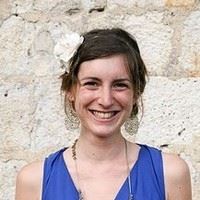
We're continuing our new series, Medievalist of the Month, with Lucie Laumonier. Lucie tells us...
I have an M.A. in history from Université de Sherbrooke (Québec) and a PhD in history from Université de Sherbrooke and Université Montpellier 3 (France). I did my PhD in a cotutelle program (joined PhD), which is a huge advantage: two advisors, membership in two universities, being immersed in two very different, yet complementary academic environments. At the moment I’m a postdoctoral fellow, thanks to a Fonds de recherche du Québec – Société et culture grant. For one year I was at University in Minnesota in the US but I’m about to transfer to Concordia University in Montréal (end of October 2015) for the second year of the postdoc.
You're arriving at an airport for a research trip and the border control agent asks what you do. How do you answer?
It’s not a question I’m frequently asked. When it happens, I usually say that I “do history”, that I go to archives centers. It’s vague but it works.
What projects are you currently working on?
I’m working on my postdoc project, based on notarial sources (wills, marriage contracts…) and judiciary documents from the Parlement de Toulouse, which focuses on families from Languedoc (south of France) from the 1250s to the end of the 15th century. I’m interested in the concepts of “crisis”, “norm” and “normality”.
At the same time, I'm working on papers oriented towards social history (urban or religious); for instance, I’m preparing a paper on devotional confraternities in Montpellier.
Finally, I am a part of two research projects. One project, lead by Geneviève Dumas (Université de Sherbrooke) focuses on urban books of accounts ; this other, coordinated by Gabriel Pizzorno and Daniel Lord Smail (Harvard) aims to create a data base of inventories of goods.
What do you think is the best part of being a medievalist?
What I like best is being able to consider the relationshop between the past and the present, and being able to question the idea of “progress” in social practices. The Middle Ages are an interesting lens for looking at our own era, and teach us a lot about ourselves.
Why did you join the CSM? What other societies do you belong to?
I’m a member of the CSM so I can keep up to date on research throughout the country and to meet other people who work on fascinating subjects! I really like the multidisciplinarity of the Society. I’m also a member of the Société des études médiévales du Québec, of the SHMESP which is a French association, and I have been up to now a member of the Center for Medieval Studies at the University of Minnesota.
Where can we find/read some of your work?
My publications list is available on Academia.edu; some articles are online on journal websites (Médiévales, Memini). My book is also available on the publisher’s website, Brepols.
Any final thoughts?
The “Medievalist of the Month” series is an excellent idea for increasing awareness of the research happening in Canada!
